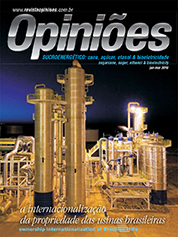Luiz Gustavo Junqueira Figueiredo
Commercial Director of Usina Alta Mogiana
Op-AA-23
The challenges of the internationalization of the sugar-based energy industry
The Brazilian sugar and ethanol industry is experiencing major transformation and big international players are acquiring assets with formidable appetite. The first phase of this movement began with the entry of large trading companies, followed by producers of sugar and ethanol from other countries. This consolidation process is still in progress, but it has a new ingredient: the interest of large oil producers in ethanol.
The announcement of the Shell/Cosan merger stands out as a divisor of waters in this dynamic market, and far-reaching changes are subsequently expected. First, other oil companies will have to review their entry strategy in Brazil, given that the current abundant offering of assets for sale is expected to diminish, to the extent that mills capitalize.
This may accelerate the merger and acquisition process in course, further concentrating the industry in the hands of a few. We will also see a clear division of strategies: some groups will bet on diversification through the distribution of fuel, investments in logistics, development of oil derivative products obtained by ethanol fermentation, and second generation ethanol.
Other producers, on the other hand, will continue their organic growth, focusing on the production of sugar, ethanol and electric power. Which strategy will prove the best? It is difficult to say, mainly because this decision also epends on the production scale and not only on one’s intentions. Some years ago, one believed that scale was important to reduce costs.
However, beginning at a certain size, production costs remain practically stable. On the other hand, scale allows differentiated access to the capital market, in addition to the possibility of leading in research and development, a fact still widely overlooked by the industry. However, only large companies may replicate the Cosan and ETH/Braskem strategy with respect to oil derivative products, given that the amounts involved will be so very large.
Perhaps the answer lies in the association with chemical companies or research centers, allowing the joint development of new technologies. What changes with respect to the value of companies? The day the Cosan merger was announced, other mill shares’ value did not change, whereas the former’s increased by more than 10%.
This shows that not necessarily other assets will increase in price in an initial moment, due to several reasons: first because other competitors may perhaps follow Shell’s example and second, because development research they currently conduct may bring disappointing results. Thus, the traditional valuation criteria, such as discounted cash flow and multiple future EBITDAs, remain applicable.
As a general rule, I see the arrival of foreign companies in Brazil positively. The concentration of production at large foreign corporate groups will provide the industry more international exposure, and this may open many doors. In addition, these organizations may improve the perception of society in relation to the industry, given that they abide by strict corporate and environmental codes of conduct.
One should not, however, be eluded to think that this growing interest signals memorable years ahead. One of the reasons why these companies are coming is because of the stability of the Brazilian economy, and not only the industry’s horizon. These companies, above all, are betting on the future of Brazil.
The stability afforded by the inflationary target policy, floating foreign exchange rate and fiscal responsibility, combined with the growth outlook, placed us in the aim of investors from other countries. The good fundaments of our economy notwithstanding, we are increasingly hostage to the local foreign exchange rate and oil prices in the international market in the long term.
Given that these markets are very volatile, the commercial and financial strategies will play a crucial role in the competitiveness and growth of mills in the future. Finally, I emphasize the growing importance of adapting financial leverage in the mills, whereas going public and opening the capital is a tool increasingly used by who wants to grow faster or simply needs to capitalize the company without the need to sell it to a third party.
One should not forget that in most companies shareholders currently lack liquidity to sell their shares, and so going public may be a good solution for this obstacle, apart from being a more coherent alternative given the dynamics of the Brazilian capital market. In a few years we may have some 200 million tons of sugarcane capacity in the stock exchange, which would be fantastic.
Such volume would result in innumerous more sophisticated financing operations made possible by the visibility afforded by the capital market. These advantages have been identified by foreign groups, given that all are traded in some stock exchange or are fully engaged in the process of going public. One can therefore conclude that we are definitively entering in a phase of many changes, in which the main one is international appetite for our assets, resulting in great transformation and challenges to how we conduct a winning long term strategy. From now on, references will change, and they will be a few steps higher than what we were used to. Those who will not keep pace with this process will become targets for acquisitions from now on. We should be watchful with respect to all this.




